- Home
- Ernest Hemingway
The Torrents of Spring
The Torrents of Spring Read online
THE TORRENTS OF SPRING
Ernest Hemingway
CONTENTS
PART ONE
Chapter One
Chapter Two
Chapter Three
Chapter Four
Chapter Five
PART TWO
Chapter Six
Chapter Seven
Chapter Eight
Chapter Nine
Chapter Ten
PART THREE
Chapter Eleven
Chapter Twelve
PART FOUR
Chapter Thirteen
Chapter Fourteen
Chapter Fifteen
Chapter Sixteen
AUTHOR’S FINAL NOTE TO THE READER
ABOUT THE AUTHOR
COPYRIGHT
ABOUT THE PUBLISHER
PART ONE
Red and Black Laughter
The only source of the true Ridiculous (as it appears to me) is affectation.
HENRY FIELDING
CHAPTER ONE
Yogi Johnson stood looking out of the window of a big pump-factory in Michigan. Spring would soon be here. Could it be that what this writing fellow Hutchinson had said, “If winter comes can spring be far behind?” would be true again this year? Yogi Johnson wondered. Near Yogi at the next window but one stood Scripps O’Neil, a tall, lean man with a tall, lean face. Both stood and looked out at the empty yard of the pump-factory. Snow covered the crated pumps that would soon be shipped away. Once the spring should come and the snow melt, workmen from the factory would break out the pumps from piles where they were snowed in and haul them down to the G. R. & I. station, where they would be loaded on flat-cars and shipped away. Yogi Johnson looked out of the window at the snowed-in pumps, and his breath made little fairy tracings on the cold windowpane. Yogi Johnson thought of Paris. Perhaps it was the little fairy tracings that reminded him of the gay city where he had once spent two weeks. Two weeks that were to have been the happiest weeks of his life. That was all behind him now. That and everything else.
Scripps O’Neil had two wives. As he looked out of the window, standing tall and lean and resilient with his own tenuous hardness, he thought of both of them. One lived in Mancelona and the other lived in Petoskey. He had not seen the wife who lived in Mancelona since last spring. He looked out at the snow-covered pump-yards and thought what spring would mean. With his wife in Mancelona Scripps often got drunk. When he was drunk he and his wife were happy. They would go down together to the railway station and walk out along the tracks, and then sit together and drink and watch the trains go by. They would sit under a pine-tree on a little hill that overlooked the railway and drink. Sometimes they drank all night. Sometimes they drank for a week at a time. It did them good. It made Scripps strong. Scripps had a daughter whom he playfully called Lousy O’Neil. Her real name was Lucy O’Neil. One night, after Scripps and his old woman had been out drinking on the railroad line for three or four days, he lost his wife. He didn’t know where she was. When he came to himself everything was dark. He walked along the railroad track toward town. The ties were stiff and hard under his feet. He tried walking on the rails. He couldn’t do it. He had the dope on that all right: He went back to walking along the ties. It was a long way into town. Finally he came to where he could see the lights of the switch-yard. He cut away from the tracks and passed the Mancelona High School. It was a yellow-brick building. There was nothing rococo about it, like the buildings he had seen in Paris. No, he had never been in Paris. That was not he. That was his friend Yogi Johnson.
Yogi Johnson looked out of the window. Soon it would be time to shut the pump-factory for the night. He opened the window carefully, just a crack. Just a crack, but that was enough. Outside in the yard the snow had begun to melt. A warm breeze was blowing. A Chinook wind the pump fellows called it. The warm chinook wind came in through the window into the pump-factory. All the workmen laid down their tools. Many of them were Indians.
The foreman was a short, iron-jawed man. He had once made a trip as far as Duluth. Duluth was far across the blue waters of the lake in the hills of Minnesota. A wonderful thing had happened to him there.
The foreman put his finger in his mouth to moisten it and held it up in the air. He felt the warm breeze on his finger. He shook his head ruefully and smiled at the men, a little grimly perhaps.
“Well, it’s a regular chinook, boys,” he said.
Silently for the most part, the workmen hung up their tools. The half-completed pumps were put away in their racks. The workmen filed, some of them talking, others silent, a few muttering, to the washroom to wash up.
Outside through the window came the sound of an Indian war-whoop.
CHAPTER TWO
Scripps O’Neil stood outside the Mancelona High School looking up at the lighted windows. It was dark and the snow was falling. It had been falling ever since Scripps could remember. A passer-by stopped and stared at Scripps. After all, what was this man to him? He went on.
Scripps stood in the snow and stared up at the lighted windows of the High School. Inside there people were learning things. Far into the night they worked, the boys vying with the girls in their search for knowledge, this urge for the learning of things that was sweeping America. His girl, little Lousy, a girl that had cost him a cool seventy-five dollars in doctors’ bills, was in there learning. Scripps was proud. It was too late for him to learn, but there, day after day and night after night, Lousy was learning. She had the stuff in her, that girl.
Scripps went on up to his house. It was not a big house, but it wasn’t size that mattered to Scripps’s old woman.
“Scripps,” she often said when they were drinking together, “I don’t want a palace. All I want is a place to keep the wind out.” Scripps had taken her at her word. Now, as he walked in the late evening through the snow and saw the lights of his own home, he felt glad that he had taken her at her word. It was better this way than if he were coming home to a palace. He, Scripps, was not the sort of chap that wanted a palace.
He opened the door of his house and went in. Something kept going through his head. He tried to get it out, but it was no good. What was it that poet chap his friend Harry Parker had met once in Detroit had written? Harry used to recite it: “Through pleasures and palaces though I may roam. When you something something something there’s no place like home.” He could not remember the words. Not all of them. He had written a simple tune to it and taught Lucy to sing it. That was when they first were married. Scripps might have been a composer, one of these chaps that write the stuff the Chicago Symphony Orchestra plays, if he had had a chance to go on. He would get Lucy to sing that song tonight. He would never drink again. Drinking robbed him of his ear for music. Times when he was drunk the sound of the whistles of the trains at night pulling up the Boyne Falls grade seemed more lovely than anything this chap Stravinsky had ever written. Drinking had done that. It was wrong. He would get away to Paris. Like this chap Albert Spalding that played the violin.
Scripps opened the door. He went in. “Lucy,” he called, “it is I, Scripps.” He would never drink again. No more nights out on the railroad. Perhaps Lucy needed a new fur coat. Perhaps, after all, she had wanted a palace instead of this place. You never knew how you were treating a woman. Perhaps, after all, this place was not keeping out the wind. Fantastic. He lit a match. “Lucy!” he called, and there was a note of dumb terror in his mouth. His friend Walt Simmons had heard just such a cry from a stallion that had once been run over by a passing autobus in the Place Vendome in Paris. In Paris there were no geldings. All the horses were stallions. They did not breed mares. Not since the war. The war c
hanged all that.
“Lucy!” he called, and again “Lucy!” There was no answer. The house was empty. Through the snow-filled air, as he stood there alone in his tall leanness, in his own deserted house, there came to Scripps’s ears the distant sound of an Indian war-whoop.
CHAPTER THREE
Scripps left Mancelona. He was through with that place. What had a town like that to give him? There was nothing to it. You worked all your life and then a thing like that happened. The savings of years wiped out. Everything gone. He started to Chicago to get a job. Chicago was the place. Look at its geographical situation, right at the end of Lake Michigan. Chicago would do big things. Any fool could see that. He would buy land in what is now the Loop, the big shopping and manufacturing district. He would buy the land at a low price and then hang onto it. Let them try and get it away from him. He knew a thing or two now.
Alone, bareheaded, the snow blowing in his hair, he walked down the G. R. & I. railway tracks. It was the coldest night he had ever known. He picked up a dead bird that had frozen and fallen onto the railroad tracks and put it inside his shirt to warm it. The bird nestled close to his warm body and pecked at his chest gratefully.
“Poor little chap,” Scripps said. ‘‘’You feel the cold too.”
Tears came into his eyes.
“Drat that wind,” Scripps said and once again faced into the blowing snow. The wind was blowing straight down from Lake Superior. The telegraph wires above Scripps’s head sang in the wind. Through the dark, Scripps saw a great yellow eye coming toward him. The giant locomotive came nearer through the snow-storm. Scripps stepped to one side of the track to let it go by. What is it that old writing fellow Shakespeare says: “Might makes right”? Scripps thought of that quotation as the train went past him in the snowing darkness. First the engine passed. He saw the fireman bending to fling great shovelfuls of coal into the open furnace door. The engineer wore goggles. His face was lit up by the light from the open door of the engine. He was the engineer. It was he who had his hand on the throttle. Scripps thought of the Chicago anarchists who, when they were hanged, said: “Though you throttle us today, still you cannot something something our souls.” There was a monument where they were buried in Waldheim Cemetery, right beside the Forest Park Amusement Park, in Chicago. His father used to take Scripps out there on Sundays. The monument was all black and there was a black angel. That was when Scripps had been a little boy. He used often to ask his father: “Father, why if we come to look at the anarchists on Sunday why can’t we ride on the shoot the chutes?” He had never been satisfied with his father’s answer. He had been a little boy in knee pants then. His father had been a great composer. His mother was an Italian woman from the north of Italy. They are strange people, these north Italians.
Scripps stood beside the track, and the long black segments of the train clicked by him in the snow. All the cars were Pullmans. The blinds were down. Light came in thin slits from the bottom of the dark windows as the cars went by. The train did not roar by as it might have if it had been going in the other direction, because it was climbing the Boyne Falls grade. It went slower than if it had been going down. Still it went too fast for Scripps to hitch on. He thought how he had been an expert at hitching on grocery wagons when he was a young boy in knee pants.
The long black train of Pullman cars passed Scripps as he stood beside the tracks. Who were in those cars? Were they Americans, piling up money while they slept? Were they mothers? Were they fathers? Were there lovers among them? Or were they Europeans, members of a worn-out civilization world-weary from the war? Scripps wondered.
The last car passed him and the train went on up the track. Scripps watched the red light at its stern disappearing into the blackness through which the snowflakes now came softly. The bird fluttered inside his shirt. Scripps started along the ties. He wanted to get to Chicago that night, if possible, to start work in the morning. The bird fluttered again. It was not so feeble now. Scripps put his hand on it to still its little bird flutterings. The bird was calmed. Scripps strode on up the track.
After all, he did not need to go as far as Chicago. There were other places. What if that critic fellow Henry Mencken had called Chicago the Literary Capital of America? There was Grand Rapids. Once in Grand Rapids, he could start in in the furniture business. Fortunes had been made that way. Grand Rapids furniture was famous wherever young couples walked in the evening to talk of home-making. He remembered a sign he had seen in Chicago as a little boy. His mother had pointed it out to him as together they walked barefoot through what now is probably the Loop, begging from door to door. His mother loved the bright flashing of the electric lights in the sign.
“They are like San Miniato in my native Florence,” she told Scripps. “Look at them; my son,” she said, “for some day your music will be played there by the Firenze Symphony Orchestra.”
Scripps had often watched the sign for hours while his mother slept wrapped in an old shawl on what is now probably the Blackstone Hotel. The sign had made a great impression on him.
LET HARTMAN FEATHER YOUR NEST it had said. It flashed in many different colors. First a pure, dazzling white. That was what Scripps loved best. Then it flashed a lovely green. Then it flashed red. One night as he lay crouched against his mother’s body warmth and watched the sign flash, a policeman came up. “You’ll have to move along,” he said.
Ah, yes, there was big money to be made in the furniture business if you knew how to go about it. He, Scripps, knew all the wrinkles of that game. In his own mind it was settled. He would stop at Grand Rapids. The little bird fluttered, happily now.
“Ah, what a beautiful gilded cage I’ll build for you, my pretty one,” Scripps said exultantly. The little bird pecked him confidently. Scripps strode on in the storm. The snow was beginning to drift across the track. Borne on the wind, there came to Scripps’s ears the sound of a far-off Indian war-whoop.
CHAPTER FOUR
Where was Scripps now? Walking in the night in the storm, he had become confused. He had started for Chicago after that dreadful night when he had found that his home was a home no longer. Why had Lucy left? What had become of Lousy? He, Scripps, did not know. Not that he cared. That was all behind him. There was none of that now. He was standing knee-deep in snow in front of a railway station. On the railway station was written in big letters:
PETOSKEY
There were a pile of deer shipped down by hunters from the Upper Peninsula of Michigan, lying piled the one on the other, dead and stiff and drifted half over with snow on the station platform. Scripps read the sign again. Could this be Petoskey?
A man was inside the station, tapping something back of a wicketed window. He looked out at Scripps. Could he be a telegrapher? Something told Scripps that he was.
He stepped out of the snow-drift and approached the window. Behind the window the man worked busily away at his telegrapher’s key.
“Are you a telegrapher?” asked Scripps.
“Yes, sir,” said the man. “I’m a telegrapher.”
“How wonderful!”
The telegrapher eyed him suspiciously. After all, what was this man to him?
“Is it hard to be a telegrapher?” Scripps asked. He wanted to ask the man outright if this was Petoskey. He did not know this great northern section of America, though, and he wished to be polite.
The telegrapher looked at him curiously.
“Say,” he asked, “are you a fairy?”
“No,” Scripps said. “I don’t know what being a fairy means.”
“Well,” said the telegrapher, “what do you carry a bird around for?”
“Bird?” asked Scripps. “What bird?”
“That bird that’s sticking out of your shirt.” Scripps was at a loss. What sort of chap was this telegrapher? What sort of men went in for telegraphy? Were they like composers? Were they like artis
ts? Were they like writers? Were they like the advertising men who write the ads in our national weeklies? Or were they like Europeans, drawn and wasted by the war, their best years behind them? Could he tell this telegrapher the whole story? Would he understand?
“I started home,” he began. “I passed the Mancelona High School—”
“I knew a girl in Mancelona,” the telegrapher said. “Maybe you knew her. Ethel Enright.”
It was no good going on. He would cut the story short. He would give the bare essentials. Besides, it was beastly cold. It was cold standing there on the wind-swept station platform. Something told him it was useless to go on. He looked over at the deer lying there in a pile, stiff and cold. Perhaps they, too, had been lovers. Some were bucks and some were does. The bucks had horns. That was how you could tell. With cats it is more difficult. In France they geld the cats and do not geld the horses. France was a long way off.
“My wife left me,” Scripps said abruptly.
“I don’t wonder if you go around with a damn bird sticking out of your shirt,” the telegrapher said.
“What town is this?” Scripps asked. The single moment of spiritual communion they had had, had been dissipated. They had never really had it. But they might have. It was no use now. It was no use trying to capture what had gone. What had fled.
“Petoskey,” the telegrapher replied.
“Thank you,” Scripps said. He turned and walked into the silent, deserted Northern town. Luckily, he had four hundred and fifty dollars in his pocket. He had sold a story to George Horace Lorimer just before he had started out with his old woman on that drinking trip. Why had he gone at all? What was it all about, anyway?
Coming toward him down the street came two Indians. They looked at him, but their faces did not change. Their faces remained the same. They went into McCarthy’s barber shop.

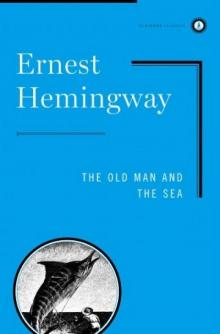 The Old Man and the Sea
The Old Man and the Sea Green Hills of Africa
Green Hills of Africa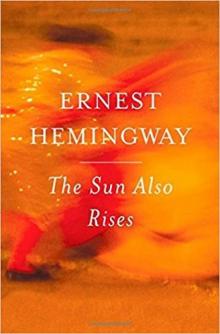 The Sun Also Rises
The Sun Also Rises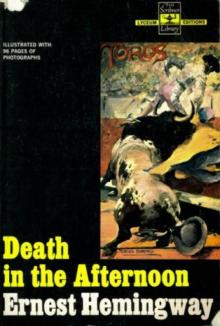 Death in the Afternoon
Death in the Afternoon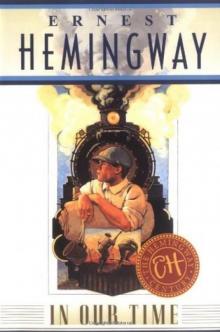 In Our Time
In Our Time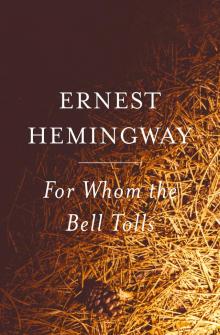 For Whom the Bell Tolls
For Whom the Bell Tolls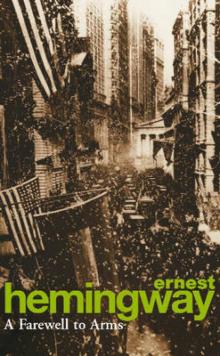 A Farewell to Arms
A Farewell to Arms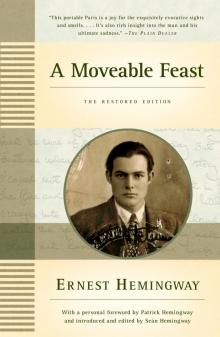 A Moveable Feast
A Moveable Feast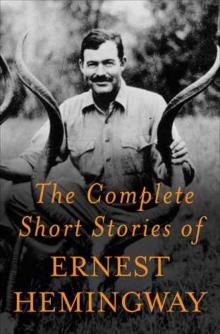 The Complete Short Stories of Ernest Hemingway
The Complete Short Stories of Ernest Hemingway Big Two-Hearted River
Big Two-Hearted River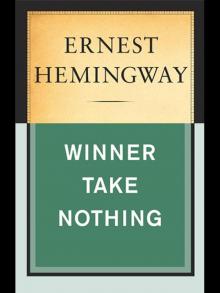 Winner Take Nothing
Winner Take Nothing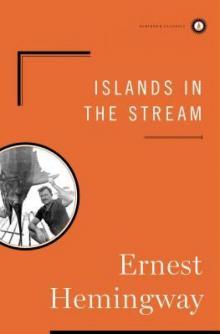 Islands in the Stream
Islands in the Stream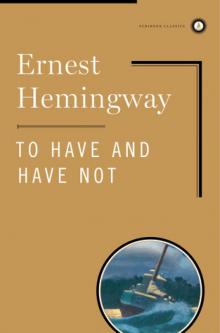 To Have and Have Not
To Have and Have Not The Snows of Kilimanjaro and Other Stories
The Snows of Kilimanjaro and Other Stories Across the River and Into the Trees
Across the River and Into the Trees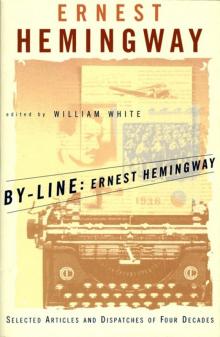 By-Line Ernest Hemingway
By-Line Ernest Hemingway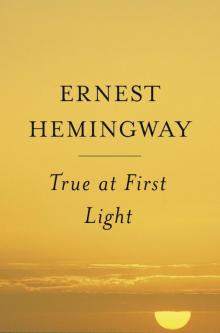 True at First Light
True at First Light Men Without Women
Men Without Women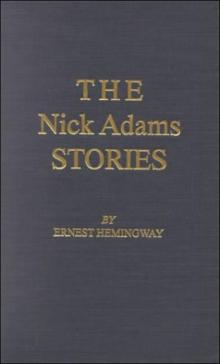 The Nick Adams Stories
The Nick Adams Stories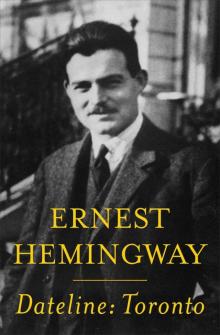 Dateline- Toronto
Dateline- Toronto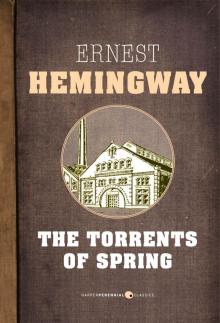 The Torrents of Spring
The Torrents of Spring Short Stories
Short Stories